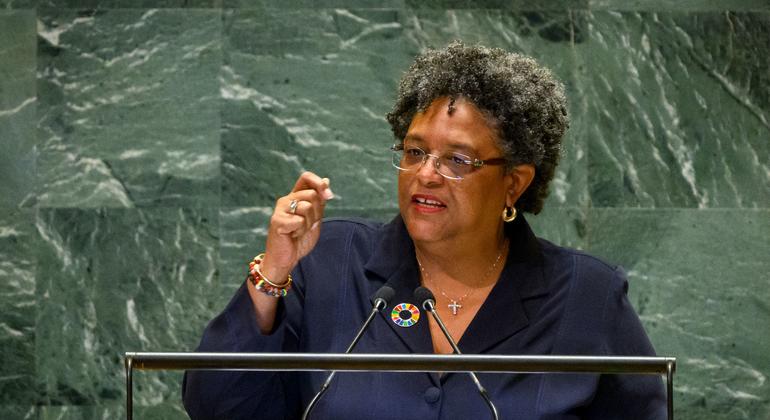Prime Minister Mia Mottley delivered a powerful statement at the annual general debate, addressing the numerous crises that the world has faced over the last four years. Describing these challenges as ‘poly-crises,’ she emphasized the urgent need for a global reset to address issues such as the climate crisis, the lingering effects of the pandemic, and the ongoing conflicts and humanitarian crises in various parts of the world.
Mottley highlighted the devastating impact of wars in regions like Ukraine, Gaza, and Sudan, stressing that the world cannot afford the distraction of armed conflict when there are pressing issues that require collective action and solutions. She called on leaders to pause and reset their approach, both on an international level and within their own countries, in order to deliver new opportunities and solutions that can uplift communities and restore a sense of hope and progress.
The Barbadian Prime Minister emphasized that the current crises are dampening economic growth, restricting the ambitions of people, and undermining the fundamental values of humanity. She noted that citizens around the world are demanding change and that it is incumbent upon leaders to respond effectively to their needs and aspirations.
Mottley underscored the importance of a global reset that targets the existing rules and institutions, aiming to end discrimination and inequality that perpetuate divisions between first- and second-class citizens based on their nationality. She called for a more inclusive and responsive international order that prioritizes the well-being and dignity of all individuals, regardless of their background or circumstances.
As the world marks the final year of the UN Decade, Mottley and the Caribbean Community (CARICOM) advocated for the immediate proclamation of a second Decade to address the issue of reparations for slavery and colonialism. She highlighted the need for global solidarity and action to address historical injustices and create a more equitable and just world for future generations.
Amidst ongoing conflicts and challenges, Mottley emphasized the crucial role of the United Nations in promoting peace and security worldwide. She called for reforms within the UN, particularly the Security Council, to ensure that it is equipped to address the complex and evolving threats to international peace and security in the 21st century.
Despite the daunting challenges facing the world, Mottley also expressed optimism about recent developments, such as the adoption of the Pact for the Future by global leaders. This landmark declaration represents a commitment to fostering sustainable development, peace, and stronger global governance, signaling a potential shift towards a more cooperative and coordinated approach to addressing global challenges.
In conclusion, Mottley stressed the urgent need for a global reset on peace, emphasizing that peace should be a top priority for all nations and individuals. She called on leaders to work together towards achieving global peace and security, recognizing that it is a fundamental prerequisite for addressing the multifaceted crises that confront the world today.
Overall, Mottley’s statement at the annual general debate underscored the importance of collective action, solidarity, and leadership in addressing the complex challenges facing the world and building a more just, peaceful, and sustainable future for all.









